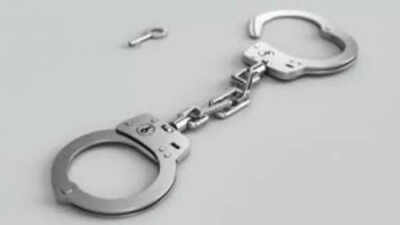Top Searches
- News
- City News
- bengaluru News
- Since 2019, over 1,000 held for trafficking, 21 punished in Karnataka
Since 2019, over 1,000 held for trafficking, 21 punished in Karnataka

Image used for representative purpose only.
BENGALURU: Between January 2019 and August 2022, more than 1,000 people were arrested for trafficking women and children in over 470 cases across Karnataka. However, only 21 of them — or 2% — have been punished so far.
According to state government data, most of the 1,005 accused (288) were arrested in 2019 while the most accused — seven of 21 — were punished in 2021.
A district-wise analysis shows that more than 62% of the cases (295 of 471) were registered in Bengaluru, while 74% of the accused (744 of 1,005) were from Bengaluru. However, no person arrested in Bengaluru is among the 21 punished.
DG&IGP Praveen Sood told TOI: “In these cases, women are victims and customers are not treated as culprits. Only procurers making money using the women are booked for the crime. These are challenging cases to prosecute as in a majority of them, the witnesses — the women and the customers — turn hostile.” He said convictions are, however, achieved in cases where women have been mistreated by procurers and forced into sex work. “Here the women give witness and help with evidence.”
Aside from enforcement by police, the state has also formed more than 8,900 vigilance committees at the gram panchayat level to tackle trafficking and they meet regularly to identify issues and resolve them. Between April 2020 and November 2022, these committees held more than 15,600 meetings.
Ramanagara district has the most such committees (over 900) followed by Belagavi, Tumakuru and Chitradurga.
Rescue & rehabilitation
Separate data shows that between April 2020 and November 2022, more than 1,400 victims of trafficking, including 430 children, were rescued and rehabilitated at 15 voluntary organisations.
According to the government, rescued children are provided education and rehabilitation, while the women are given free stay and food at these organisations. “...Aside from that, they are given different types of vocational training and counselling. In specific cases, they are even allowed to access free legal aid,” a women and child development department official said.
In the case of foreigners, the outfits are empowered to initiate the legal process to send the victims back to their countries.
According to state government data, most of the 1,005 accused (288) were arrested in 2019 while the most accused — seven of 21 — were punished in 2021.
A district-wise analysis shows that more than 62% of the cases (295 of 471) were registered in Bengaluru, while 74% of the accused (744 of 1,005) were from Bengaluru. However, no person arrested in Bengaluru is among the 21 punished.
DG&IGP Praveen Sood told TOI: “In these cases, women are victims and customers are not treated as culprits. Only procurers making money using the women are booked for the crime. These are challenging cases to prosecute as in a majority of them, the witnesses — the women and the customers — turn hostile.” He said convictions are, however, achieved in cases where women have been mistreated by procurers and forced into sex work. “Here the women give witness and help with evidence.”
Aside from enforcement by police, the state has also formed more than 8,900 vigilance committees at the gram panchayat level to tackle trafficking and they meet regularly to identify issues and resolve them. Between April 2020 and November 2022, these committees held more than 15,600 meetings.
Ramanagara district has the most such committees (over 900) followed by Belagavi, Tumakuru and Chitradurga.
Rescue & rehabilitation
Separate data shows that between April 2020 and November 2022, more than 1,400 victims of trafficking, including 430 children, were rescued and rehabilitated at 15 voluntary organisations.
According to the government, rescued children are provided education and rehabilitation, while the women are given free stay and food at these organisations. “...Aside from that, they are given different types of vocational training and counselling. In specific cases, they are even allowed to access free legal aid,” a women and child development department official said.
In the case of foreigners, the outfits are empowered to initiate the legal process to send the victims back to their countries.
FOLLOW US ON SOCIAL MEDIA
FacebookTwitterInstagramKOO APPYOUTUBE
Start a Conversation









